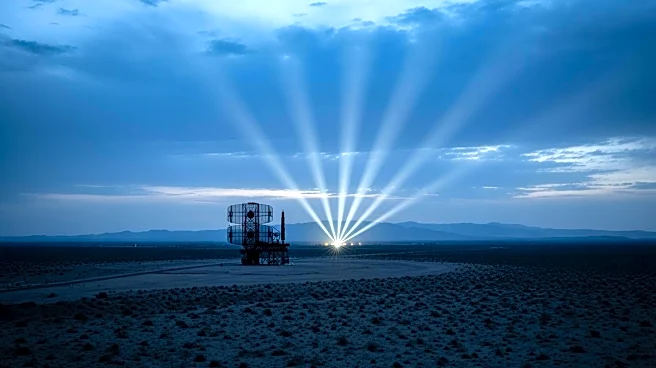What's Happening?
Greece has signed a significant agreement with Ukraine to facilitate the delivery of U.S. liquefied natural gas (LNG) to Ukraine, aiming to bolster energy security in the region. The deal, signed on November 16, involves the transportation of LNG through
Greece to Ukraine, with deliveries set to begin in January 2026. This initiative is part of a broader U.S. plan to replace Russian gas with American LNG. Greek Prime Minister Kyriakos Mitsotakis emphasized Greece's support for Ukraine, citing the importance of sovereignty and international law. Ukrainian President Volodymyr Zelenskyy expressed gratitude for the support, highlighting the challenges posed by Russian attacks on Ukraine's energy infrastructure. The agreement has sparked anger from Russia, with the Russian Foreign Ministry accusing Greece of taking a confrontational stance.
Why It's Important?
The agreement between Greece and Ukraine is a strategic move to enhance energy security in Europe, particularly as Ukraine faces ongoing threats to its energy infrastructure from Russia. By facilitating the delivery of U.S. LNG, Greece is helping to reduce European dependence on Russian gas, which has been a critical geopolitical issue. This move aligns with broader Western efforts to isolate Russia economically and politically. The deal also underscores Greece's commitment to supporting Ukraine amid its conflict with Russia, potentially strengthening diplomatic ties between Greece, Ukraine, and the U.S. However, it risks escalating tensions with Russia, which has already expressed strong disapproval of the agreement.
What's Next?
The implementation of the LNG deliveries is scheduled to begin in early 2026, with Greece providing interim natural gas supplies to Ukraine. The agreement may lead to increased diplomatic and economic collaboration between Greece and Ukraine, particularly in areas like cybersecurity and military cooperation. Russia's response to the agreement could involve further diplomatic or economic measures against Greece, potentially affecting regional stability. The European Union's support for Greece in this matter suggests continued efforts to bolster defense readiness against Russian threats.
Beyond the Headlines
The agreement highlights the complex geopolitical dynamics in Europe, where energy security is intertwined with political alliances and conflicts. Greece's decision to support Ukraine reflects broader European concerns about Russian aggression and the need for energy diversification. The deal may also influence other European countries to reconsider their energy dependencies and align more closely with U.S. energy policies. Additionally, the agreement could have long-term implications for the European energy market, potentially accelerating the transition to alternative energy sources.















